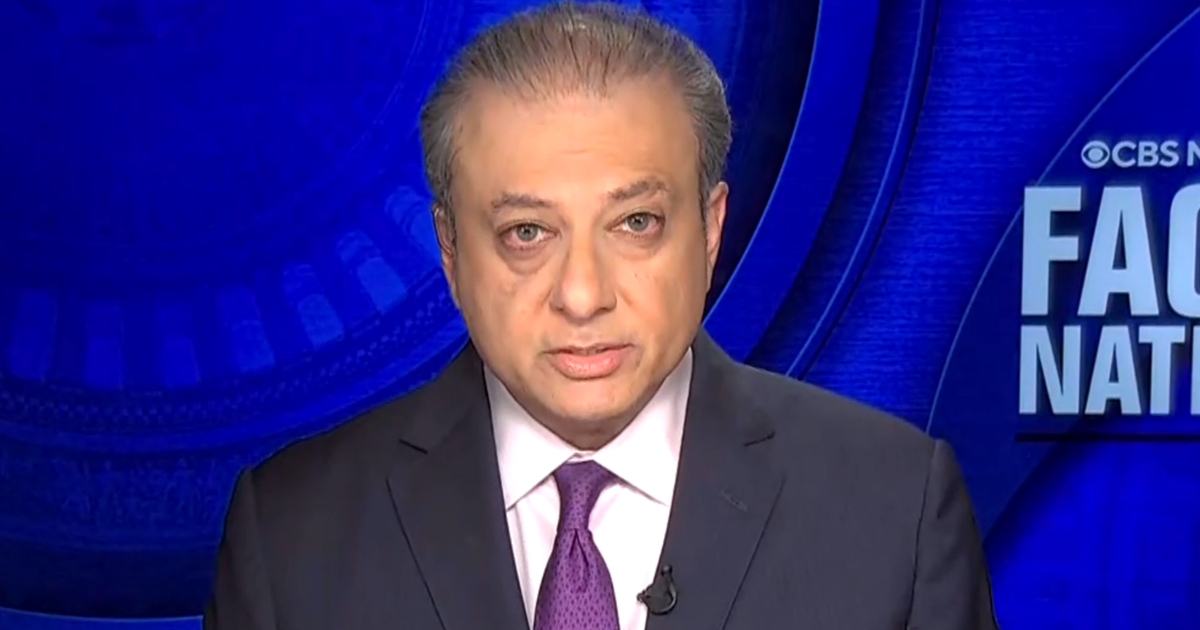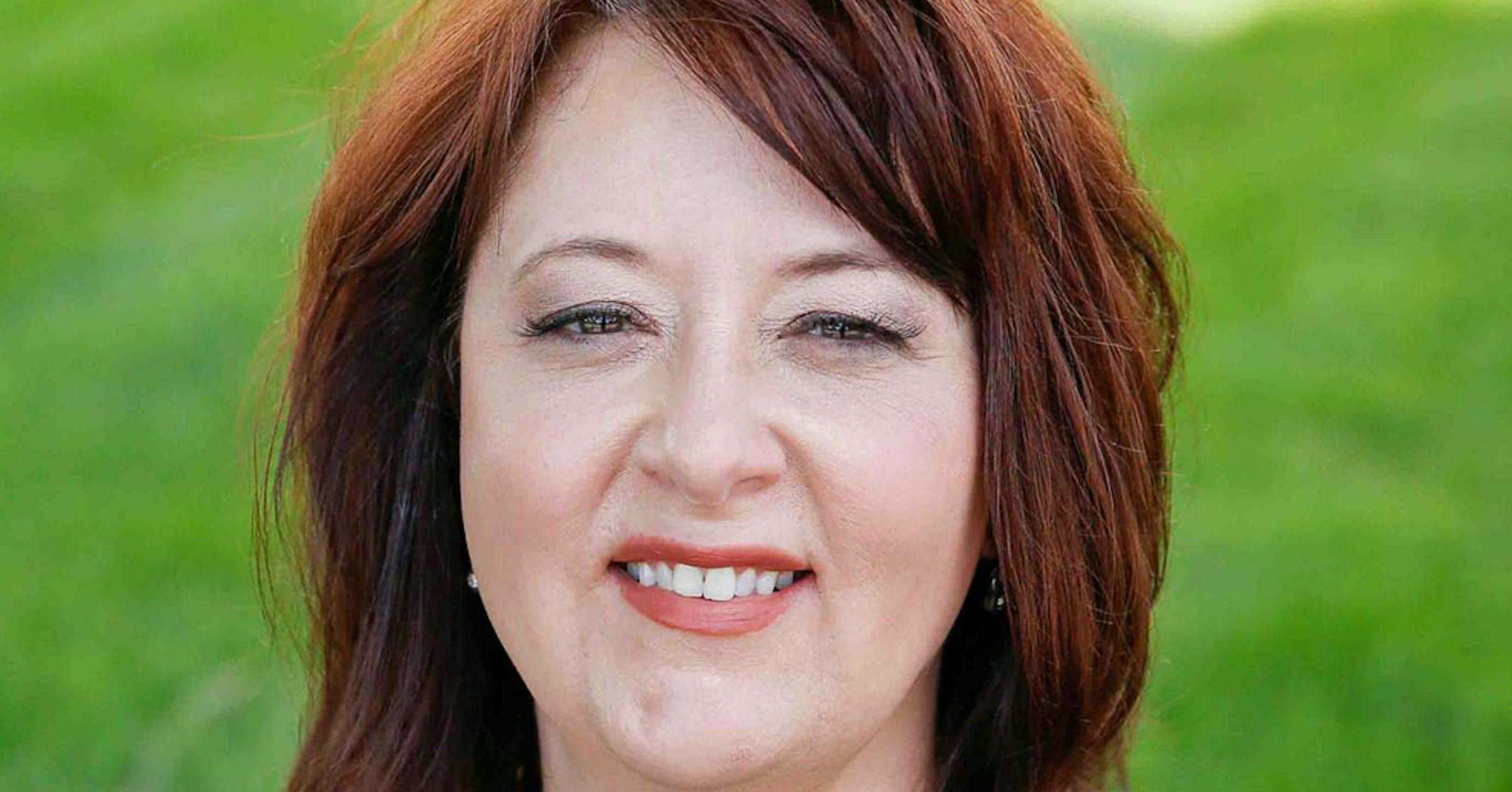CBS News
Transcript: Preet Bharara, former U.S. attorney for the Southern District of New York, on “Face the Nation,” June 2, 2024

The following is a transcript of an interview with Preet Bharara, former U.S. attorney for the Southern District of New York, on “Face the Nation” that aired on June 2, 2024.
MARGARET BRENNAN: And we turn now to former US Attorney for the Southern District of New York, Preet Bharara, who endorsed Alvin Bragg, the District Attorney of Manhattan in his election. He also used to work with, and actually hired, Trump’s attorney in the case, Todd Blanche. Good morning to you Preet.
PREET BHARARA: Good morning. I just want a quick correction. I didn’t hire Todd Blanche, but I did promote him twice. And I consider both Alvin Bragg and Todd Blanche to be friends of mine.
MARGARET BRENNAN: And to be- he was Mr. Trump’s attorney in this trial. So what does having this criminal record now do for Donald Trump with these other three criminal cases?
BHARARA: Well, so that’s an interesting question. You know, there’s a lot of speculation about whether or not this criminal conviction will result in a- in a incarcerated period for Donald Trump. That’s up in the air, there are arguments in favor, there are arguments against. But whatever happens, the fact of this criminal conviction will be on his record if it- if it remains. At such a time as the future criminal trials take place, and if he gets a conviction on the federal counts in the future, the fact of this conviction here, if it’s still on the books, would result in a potential higher prison sentence in those future cases. So it does have a consequence, because he will now, unlike a week ago, have a criminal record and criminal records are taken into account in meeting out punishment.
MARGARET BRENNAN: Important point. You said you had promoted the president’s attorney when you used to work together. Would you promote him based on his performance in court defending Mr. Trump?
BHARARA: You know, it’s a very easy thing that- that I do and other people do on the panel, and criticize people’s performances. Sometimes it’s the case that someone could do a better job at trial. Trials are difficult and there’s a lot of scrutiny here. But sometimes the facts and the law are what the facts of the law are. And sometimes terrific defense lawyers, who performed very, very well, lose, and sometimes not good defense lawyers win because the government hasn’t proven its case. So I’m not gonna take potshots at Adam. I thought- I think he could have been stronger in some of the cross examinations. And I’ll leave it at that.
MARGARET BRENNAN: Well, sentencing is July 4, excuse me, July 11, four days before the convention, as we mentioned. What grounds for appeal do you think Mr. Trump has here?
BHARARA: So I think they’ll make a number of key points. You know, Donald Trump does not want to leave anything on the cutting room floor. I think some of his arguments are non frivolous. I agree with what Jan said, that in the ordinary course, it’s very, very difficult to get a criminal conviction overturned, but it happens. It’s happened to me, it’s happened to any good prosecutor’s office that brings aggressive cases. Nobody has a 100% record on appeal. That said, it’s a very low percentage. I think a number of things, including the fact that the judge didn’t change the venue, the fact that the judge didn’t recuse himself. I don’t think those are strong, but I think those will be made. The fact that Stormy Daniels testified a bit broadly about some of the scurrilous details of their sexual encounter, they will argue were prejudicial and should not have been allowed to come in, although they opened the door to that, arguably. And then there’s this sort of technical business that I’m sure causes lay people’s eyes to glaze over. And that is the degree to which the second crime, the thing that made and transformed the misdemeanor into a felony, the basis of that did not have to be decided unanimously by the jury. So the- the further crime, the felony, was appropriate, based on the jury’s decision, if there was- the falsification of the business documents was done to further or to conceal or to commit some other crime, namely, an election crime in New York, and that could have been done three different ways.
MARGARET BRENNAN: But–
BHARARA: –Jury instructions, and they don’t have to be unanimous on those three different ways. And that’s- that’s probably an issue for appeal.
MARGARET BRENNAN: Let me zero in on that, because that has been something that- that Mr. Trump and his allies have talked about. In terms of this case, this was about trying to manipulate an election and fraud related to that. His allies say this was just, it was a paperwork thing, somebody mislabeled this as a legal expense. How would you tell the lay person to understand this?
BHARARA: Look, the underlying misdemeanor and that’s why it’s a misdemeanor, is falsifying business records. But the reason it becomes a felony, not the most serious felony on the books in New York, but a felony that any felony is serious, is if that crime, that misdemeanor crime was done to conceal or commit some other crime and that other crime that the prosecutors alleged and got the convictions on, was the unla- promoting someone’s election by unlawful means.
MARGARET BRENNAN: Yeah.
BHARARA: Either done by the falsification of other documents or committing some other tax crime or in further election fraud crime. And so the prosecution, I think, did it as well as anybody could do for lay people because the jury obviously was a series of lay people. But this was a serious thing that undermined and interfered with the election in 2016. And that’s serious and not to be taken lightly.
MARGARET BRENNAN: So, you know, we’re seeing some rhetoric from Republican lawmakers, including Senator Marco Rubio, who said Mr. Trump was held hostage, the victim of a sham political show trial, like the ones the communists used in Cuba and the Soviet Union, railing against the ruling class. In terms of our judicial system in this country, how should someone understand a characterization like that?
BHARARA: Well, I think you know, it’s silly. It’s completely silly. The trial, and all aspects of the trial were done openly and in public. The jury selection process, someone needs to be reminded, was participated in by the Trump legal team as well. They had all the peremptory challenges that they’re accorded by law. The judge, although there’s some, you know, accusations made about his impartiality, or lack thereof, his rulings are there to see, as other people have pointed out. He ruled in favor of the Trump team sometimes, he ruled against the Trump team sometimes. He was pretty fair and even handed. A jury of 12 people–
MARGARET BRENNAN: –Yeah–
BHARARA: –Who were selected and approved by both sides brought- brought in the verdict.
MARGARET BRENNAN: Right.
BHARARA: So I don’t know what- what a sham about it. The rules of evidence were followed and complied with. So I don’t really know what’s happening here.
MARGARET BRENNAN: Okay.
BHARARA: Other than pure partisan politics.
MARGARET BRENNAN: Well, yesterday, President Biden was spending time with his son, Hunter. And tomorrow, in another unusual situation our country is in, the Biden Justice Department will begin a trial in Delaware against the president’s son where Hunter faces three felony gun possession charges, maximum 25 years prison. How much hot water is he in here?
BHARARA: He’s in substantial hot water, because he’s been charged federally, just like Donald Trump is in a lot of hot water being charged in a state court. But I think an important thing to consider here, by the way, in the wake of your question about the- the accusations of this vast conspiracy by both state prosecutors and the- and the federal Justice Department that is acting in a witch hunt fashion, in a partisan fashion to bring down the Republican Party. Here you have the son of the sitting President of the United States of America going to trial at the hands of his own Justice Department. In a million years, can anyone listening to this broadcast understand and expect that if- if Donald Trump was elected again, and a Biden holdover US attorney were to indict Donald Trump Jr., that Donald Trump wouldn’t do something about it in the way that Joe Biden has stayed out of it? I don’t think so. So that’s an important thing to remember. And also, the other thing that’s happening this week is a continuation of the trial against Democratic senior and important Senator Bob Menendez–
MARGARET BRENNAN: –Yes–
BHARARA: –By the same Justice Department that these politicians are accusing of being partisan.
MARGARET BRENNAN: Okay. Preet Bharara, thank you for your insight and analysis. We’re gonna have to leave it there. And Face the Nation will be back in a minute.
CBS News
Democratic senators ask Pentagon and DOJ to investigate any Elon Musk contact with Putin and other top Russians

Two top Democratic senators are asking the Pentagon and the Justice Department to investigate billionaire Trump ally Elon Musk’s reported contacts with Russian President Vladimir Putin and other top Russian officials in recent years.
Sen. Jack Reed, chairman of the Senate Armed Services Committee, and Sen. Jeanne Shaheen, a top member of the Senate Armed Services and Foreign Relations Committees, wrote a letter to Defense Department Inspector General Robert Storch and Attorney General Merrick Garland Friday, urging them to determine whether Musk’s reported contacts with the Russians should force a review of the federal government’s contracts with his company, SpaceX. Reuters was first to report the request.
The Wall Street Journal reported in October that Musk has been in regular contact with Putin since late 2022, and that Putin asked Musk to activate his Starlink satellite internet program over Taiwan for Chinese President Xi Jinping. SpaceX did not immediately respond to a request for comment.
Shaheen and Reed expressed concern that giving a security clearance to someone with a reported history of Russian communications could pose a national security risk.
“These relationships between a well-known U.S. adversary and Mr. Musk, a beneficiary of billions of dollars in U.S. government funding, pose serious questions regarding Mr. Musk’s reliability as a government contractor and a clearance holder,” the senators wrote.
The world’s richest man has become a close ally of President-elect Donald Trump in recent months, giving over $130 million to help elect him, campaigning and traveling with him, and weighing in on Cabinet picks. Trump announced earlier this week that he’s tapping Musk and businessman Vivek Ramaswamy to lead a new Department of Government Efficiency.
CBS News also reported Friday that Musk recently met with Iran’s ambassador to the U.N., Amir Saeid Iravani, at the ambassador’s residence in New York, according to two sources familiar with the meeting. The U.S. does not have diplomatic relations with Iran.
The senators also sent a separate letter to Air Force Secretary Frank Kendall, expressing their concern that the Space Force’s reliance on SpaceX could also affect national security.
and
contributed to this report.
CBS News
Man accused of killing Georgia nursing student Laken Riley “went hunting for females,” prosecutor says

A Venezuelan man “went hunting for females on the University of Georgia’s campus” earlier this year and ended up killing nursing student Laken Riley after a struggle, a prosecutor said Friday. The man’s lawyer, though, said the evidence is circumstantial and doesn’t prove his client is guilty.
Jose Ibarra, who entered the U.S. illegally, is charged with murder in the February killing, which helped fan the immigration debate during this year’s presidential campaign. Ibarra waived his right to a jury trial, meaning his case is being heard and decided by Athens-Clarke County Superior Court Judge H. Patrick Haggard.
Prosecutor Sheila Ross told the judge that Ibarra encountered Riley Feb. 22 while she was running on the University of Georgia campus in Athens. Riley, 22, was a student at Augusta University College of Nursing, which also has a campus in the city that is about 70 miles east of Atlanta.
“When Laken Riley refused to be his rape victim, he bashed her skull in with a rock repeatedly,” Ross said, adding that the evidence would show that Riley “fought for her life, for her dignity.”
As a result of that fight, Ibarra’s DNA was left under her fingernails, Ross said. Riley called 911 and, in a struggle over her phone, Ibarra’s thumbprint was left on the screen, she said.
That forensic evidence is sufficient to prove Ibarra’s guilt, but digital and video evidence also prove that Ibarra killed Riley, the prosecutor said.
Augusta University
Defense attorney Dustin Kirby called the evidence in the case graphic and disturbing, but he said none of it proves that his client killed Riley.
“The evidence in this case is very good that Laken Riley was murdered,” he said. “The evidence that Jose Ibarra killed Laken Riley is circumstantial.”
The killing added fuel to the national debate over immigration when federal authorities said Ibarra illegally entered the U.S. in 2022 and was allowed to stay to pursue his immigration case.
Republicans, including President-elect Donald Trump, blamed Democratic President Joe Biden’s border policies for her death. As he spoke about border security during his State of the Union address weeks after the killing, Biden mentioned Riley by name.
ELIJAH NOUVELAGE/AFP via Getty Images
Riley’s mother, Allyson Phillips, and other family members packed the courtroom Friday morning but didn’t return after lunch. Phillips put her face in her hands and cried frequently, especially when photos of her daughter were shown and during descriptions of what happened to her.
Ibarra, dressed in a plaid shirt and dark slacks and with his feet chained, wore headphones to hear a Spanish-language interpreter. He appeared attentive, sometimes looking up when photos or video were shown and other times looking down at his lap.
During her opening statement, Ross laid out a timeline using doorbell and surveillance camera footage, as well as data from Riley’s phone and watch, to piece together her final moments.
Riley left home at 9:03 a.m. and headed for wooded trails where she often ran. Data from her watch shows that at 9:10 a.m., she was running at a fast pace when something happened that made her “stop dead in her tracks.” She called 911 at 9:11 a.m.
A 911 dispatcher answered but no one responded when she repeatedly sought a response, and then the call was ended by the caller. The dispatcher immediately called back, but no one answered.
“Her encounter with him was long. Her fight with him was fierce,” Ross said, noting that Riley’s watch data showed her heart was still beating until 9:28 a.m.
Ross also played security camera video that shows a man she said is Ibarra at 9:44 a.m. in a parking lot at his apartment complex. The man tossed something in a recycling bin and then appeared to throw something in nearby bushes. In the recycling bin, officers found a dark hooded jacket with blood that turned out to be Riley’s on it and strands of long dark hair caught on a button. In the bushes, they found black disposable kitchen gloves, one of which had a hole in the tip of the thumb.
Another video from about 35 minutes later shows what appeared to be the same man wearing different clothes and walking toward a trash bin with a bag and then walking back empty-handed. That bin was emptied before police were able to search it.
One of Riley’s three roommates testified that she became worried when Riley didn’t return from a run. The four friends used a phone app to track each other’s whereabouts, and Lilly Steiner testified that she became more worried when she saw that Riley’s phone showed her in the same location for a long time.
Riley often talked to her mother by phone when she ran, and her mother also became concerned that morning when her daughter didn’t answer her calls.
Steiner and another roommate, Sofia Magana, walked to the trail where the phone app indicated Riley was located. They found what they believed was one of Riley’s earbuds on the trail and returned home to call police.
One of the officers who responded found Riley’s body partially covered by leaves, 64 feet off the trail. Although her shirt had been pulled up and her underwear was showing above the lowered waistband of her running tights, Ross said there was no evidence that Riley had been sexually assaulted.
Police arrested Ibarra the day after the killing.
Before Ross played video from the body camera of the officer who found Riley, she warned Riley’s family that her dead body would be shown. Riley’s mother left the courtroom, but other family members and friends remained, some of them crying or covering their faces during the video.
Ibarra is charged with one count of malice murder, three counts of felony murder and one count each of kidnapping, aggravated assault, aggravated battery, hindering an emergency telephone call, tampering with evidence and being a peeping Tom.
Prosecutors say that on the day of Riley’s killing, Ibarra peered into the window of an apartment in a university residential building, which is the basis for the peeping Tom charge.
CBS News
Texas court clears way for controversial execution of Robert Roberson

Watch CBS News
Be the first to know
Get browser notifications for breaking news, live events, and exclusive reporting.





